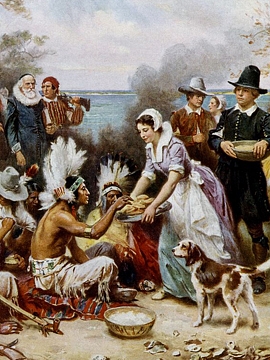Before The Revolution
By the time they had established themselves in the Tidewater region of what is now Virginia in the early 1600s, the English were relative latecomers to the world of exploration and empire. Both the Portugese, Spanish and the French were already quite well established in the region— not to mention many millions of natives who’d lived in North America for as much as 15,000 years. But following their successful settlements at Jamestown, Virginia in 1607 and Plymouth, Massachusetts in 1620, the British would eventually establish themselves as the leading cultural and political force in North America. By the Revolutionary period in the 1770s, there was an estimated 2.5 million European colonists living in British North America, which included about 500,000 people of color—most of whom were enslaved. Some of the most significant events in this period before the War for Independence that led to revolution and the creation of the American Constitution include:
1648
The Peace of Westphalia in Europe marked a profound turning point in the history of western civilization. Many historians recognize the Peace of Westphalia as the “official” end of the middle ages and the beginning of the modern period and the creation of an international order under which we still live— in which individual nation states are considered autonomous and equal entitles on the world’s stage, and that no state should determine the political or religious character of another. When combined with the principles of the enlightenment and natural rights which were starting to gain a real following in France and America, the 1648 Peace of Westphalia directly led to the democratic revolutions that began in the 18th century and continue until this day.
1649
Charles I was beheaded in England, ending royal rule (for a few years at least ). Charles was the son of King James, for whom Jamestown had been named. Part of the ongoing English Civil War, Charles I was captured, tried and executed for being a tyrannical monarch. The Protestant English Puritans in Parliament took control under the leadership of Oliver Cromwell, who essentially ruled as a dictator of the English Commonwealth.
1651
British Parliament passed the first in a series of protectionist Navigation Acts to try and control trade in the American colonies. A result of the 1648 Peace of Westphalia, the Dutch had finally won their independence from Spain, which freed Holland from a Spanish embargo and quickly led to a boom in Dutch trading on the high seas— all of which made merchants in London quite nervous about the competition. Their solution was a legislated monopoly: use the power of Parliament to pass laws that would force American merchants in the colonies to trade only with the British. But the colonial economies depended on free maritime trade routes with a variety of ports throughout Europe. Smuggling goods in and out of American ports became more common— to which Parliament responded by passing Writs of Assistance. The series of British Navigation Acts that began in 1651, and the on and off again efforts to enforce the Acts, increasingly angered the colonists and was a powerful factor that led to Revolution.
1688
After a series of struggles for power, the monarchy was restored in the “Glorious Revolution” of 1688 with the ascension of Queen Mary and her husband (and first cousin) the Dutch King William III. The significance of the Glorious Revolution was to establish the precedence that a monarch could only govern with the consent of an elected representative government of the people. The American colonists would point to this established principle time and time again during their revolution.
1689
As part of the “Glorious Revolution,” Parliament adopted the English Bill of Rights, which established the power of the people over the monarchy. The Bill identified specific rights that would always be held by Englishmen including: the right to bear arms, the right to oversee the courts and laws, the right to petition the monarch without fear of retribution, the right to resist taxes unless they have been approved by Parliament, the right to free speech, and the right to be free of cruel or unusual punishments. During the American Revolution, the colonists vociferously objected to the repeated violation of these very rights that they insisted they held as Englishmen.
1733
Parliament adopted the Molasses Act, putting a six-penny per-gallon tax on any molasses imported to America from all colonies other than British ones. This was a tariff that Parliament enacted to purposefully make molasses coming from the British West Indies cheaper than the then-preferred inexpensive molasses coming out of the French West Indies. The Molasses Act (which expired in 1763) was yet another in a series of moves by well-connected business interests in Britain to use the power of the state to monopolize and control commerce in the American colonies.
1763
The French and Indian War in North America came to an end with the signing of the Treaty of Paris on February 10. This effectively ended the Seven Years War, which had been the World War of the 18th century, fought between a number of sovereign state powers across the globe. The North American theater of that larger conflict saw the British and French— with shifting alliances of native tribes— vying for control of the interior of the continent. Unintended consequences of a British victory in the war included both the American and French revolutions in the coming decades.
Next: The Revolutionary Period (1764-1775) >>


